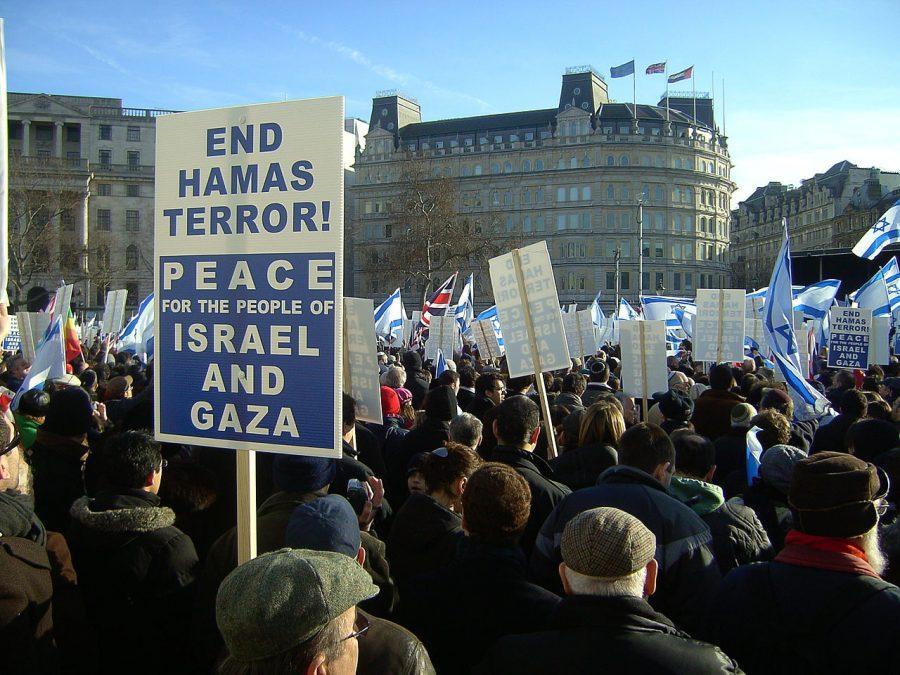Israel/Palestine: The Long Road to Peace in the Middle East
March Issue
March 5, 2017
The United Nations recently passed a resolution saying that Israel’s settlements have no legal validity. This is a major development in the Palestinian and Israeli conflict, which has been around for decades. The conflict originated in the 1900s, when the termination of the British mandate in Palestine occurred and the Israeli Declaration of Independence sparked conflict. From 1920 to 1947, the British had a mandate over Palestine. At that time, the Palestinian land included all of today’s Israel, as well as the occupied territories. Once the British mandate was terminated, and the world was in the midst of World War II, an increasing amount of the Jewish community began migrating to Palestine, in search of a homeland. As more and more people migrated, conflict struck, ultimately forming what we know as the Palestine – Israel conflict today. However, this new resolution could potentially lead to meaningful change in the current state of the conflict.
Historically, the US has been a close ally of Israel. Because of this, many found the passing of the resolution surprising. The US abstained on the resolution, which is unusual due to the fact that the US usually vetoes issues that are critical to Israel. The resolution condemned the illegal Israeli settlements, but was not set to make immediate changes to Israel, or the Palestinian-Israeli conflict. This is because the resolution is non-binding, therefore it is technically a set of recommended guidelines on how to go about the situation. According to BBC, the main concern the Israelis seemed to have was on negotiations. They feared that a resolution like this could possibly set parameters for some of the main issues in the Palestine-Israel conflict, such as borders, the wall, Jerusalem, and the Palestinian refugees. According to CNN, Palestinian leaders say that they will wait and see if Israel abides by the resolution. If not, it has been indicated that they could possibly pursue a case against Israeli Leaders at the International Criminal Court under the Geneva Convention. Clearly, issues with land and custody continue to thrive in Palestine/Israel.
During a conversation on the issue, Lena Urick ’17 commented: “As someone who has visited the Middle East in the past, it is evident that the tension between Israel and Palestine is something that needs to be solved. I was surprised by this resolution, as past resolutions have been vetoed. I hope this resolution actually affects things, and there can be peace between the two countries. That’s the only way to move forward.”
Wilmington Friends has been teaching the Palestine-Israel conflict for many years now. During a conversation about the conflict with Betsy Cepparulo, the current ninth grade Global Peace and Justice teacher, she commented on the way Friends has taught about the Palestine-Israel conflict, and the ways it changed over time.
“We end our year as the peace course has for a long time with a unit on Israel and Palestine, and the very realistic challenges to creating peace when it is desperately wanted. There used to be a panel that would come in and do a colloquium with the students because the previous peace teacher had a particular passion for the topic, and because it’s important to a lot of our students. This year, we’re having a peace colloquium about social justice instead. Not because Israel and Palestine aren’t still critically important, but because there is a pressing need in our country at the moment to talk about social justice issues.”
Prior to the conversation, Cepparulo commented that this is her opinion and her current philosophy on the issue and education of the issue.
Ruth Hazzard ’19 expressed, “I learned a lot about the Palestine/Israel conflict at Friends that I never knew before. I think the school presented it in a good informative way, without showing a bias towards either side. I believe that the UN resolution will be a good step forward.”
As time has passed, the Palestine/Israel struggle has continued to be a controversial, yet crucial, conflict. It has shown that, although there are mixed views, the resolution is just another step towards peace. It seems that at Wilmington Friends, the education of the conflict is educated and informative, and will continue to introduce students to the issues of the world. It is the hope that one day peace will be achieved between Palestine and Israel, through resolutions and negotiations to come.































